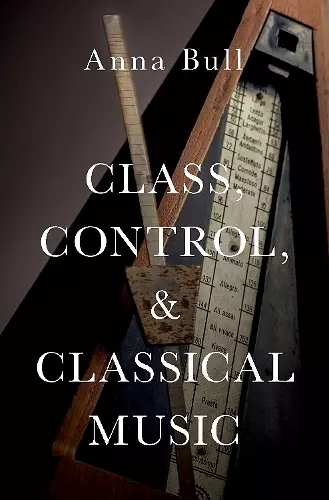Class, Control, and Classical Music
Format:Hardback
Publisher:Oxford University Press Inc
Published:18th Jul '19
Currently unavailable, and unfortunately no date known when it will be back
This hardback is available in another edition too:
- Paperback£29.99(9780197646069)

Why is classical music predominantly the preserve of the white middle classes? Contemporary associations between classical music and social class remain underexplored, with classical music primarily studied as a text rather than as a practice until recent years. In order to answer this question, this book outlines a new approach for a socio-cultural analysis of classical music, asking how musical institutions, practices, and aesthetics are shaped by wider conditions of economic inequality, and how music might enable and entrench such inequalities or work against them. This approach is put into practice through a richly detailed ethnography which locates classical music within one of the cultures that produces it - middle-class English youth - and foregrounds classical music as bodily practice of control and restraint. Drawing on the author's own background as a classical musician, this closely observed account examines youth orchestra and youth choir rehearsals as a space where young people learn the unspoken rules of this culture of weighty tradition and gendered control. It highlights how the middle-classes' habitual roles - boundary drawing around their protected spaces and reproducing their privilege through education - can be traced within the everyday spaces of classical music. These practices are camouflaged, however, by the ideology of 'autonomous art' that classical music carries. Rather than solely examining the social relations around the music, the book demonstrates how this reproductive work is facilitated by its very aesthetic, of 'controlled excitement', 'getting it right', precision, and detail. This book is of particular interest at the present moment, thanks to the worldwide proliferation of El Sistema-inspired programmes which teach classical music to children in disadvantaged areas. While such schemes demonstrate a resurgence in defending the value of classical music, there has been a lack of debate over the ways in which its socio-cultural heritage shapes its conventions today. This book locates these contestations within contemporary debates on class, gender and whiteness, making visible what is at stake in such programmes.
[A]n excellent book, written with energy and economy, deftly combining theoretical and empirical work, and written with the measured confidence of an insider, as well as the critical reflexivity of the apostate. * European Journal of Cultural Studies *
Class, Control, and Classical Music is a provocative read, designed to shake complacency and make readers think again about their own formative musical experiences. * Andrew Pinnock, University of Southampton, Cultural Trends *
- Winner of Winner of the British Sociological Association's 2020 Philip Abrams Memorial Prize.
ISBN: 9780190844356
Dimensions: 160mm x 239mm x 23mm
Weight: 499g
264 pages